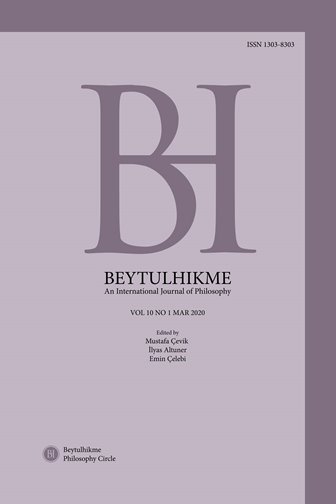Author :
Abstract
Bu çalışma, Aristoteles’in politika felsefesinde yönetimi ve politikayı, ‘yüce gönüllü’ devlet adamlarının ahlaki eylemleri olarak nasıl tanımladığını inceler. İdeal bir rejimin ve yönetimin nasıl olması gerektiği politika felsefesinin en eski meselelerinden biridir. Aristoteles’in ideal devlet adamı ve yurttaşın nasıl olmaları gerektiğine dair düşüncelerinin yanı sıra, hangi rejimin tercih edilmesi gerektiği hakkındaki kavrayışı da güncel politik meselelerin çözüme kavuşturulabilmesi için önemli birer aparat olmaya devam etmektedirler. Bu çerçevede, bu makale, Aristoteles’in insanı, diğerleriyle birlikte, birbirini tamamlayan eşgüdümlü eylemlerde bulunmaya meyilli bir varlık olarak kavramasının politika felsefesi açısından önemini analiz eder.
Keywords
Abstract
This study examines how Aristotle defines politics and administration in his political philosophy as the moral actions of the “great-souled” statesmen. How an ideal regime and administration should be is one of the oldest issues discussed by political philosophy. In addition to Aristotle's ideas about how the ideal statesman and citizen should be, his conception of the ideal regime that should be preferred continues to be important apparatuses for resolving current political issues. In this context, the article analyzes the importance, from political philosophy, of Aristotle's comprehension of the human being, as a creature that inclines to carry out coordinated actions, together with others, that complete each other.
Keywords
- Apressyan, R. G. (2016). Whether the Golden Rule Is in Aristotle’s Ethics. Rus- sian Studies in Philosophy, 54 (6), 456-470.
- Aquinas, T. (2007). Commentary on Aristotle's Politics. (Trans. R. J. Regan). Indian- apolis: Hackett Publishing.
- Aristotle (1984). The Athenian Constitution. (Trans. P. J. Rhodes). London: Penguin Classics.
- Aristotle (2004). Nicomachean Ethics. (Trans. & Ed. R. Crisp). Cambridge: Cam- bridge University Press.
- Aristotle (2009). Politics. (Trans. E. Barker). Oxford: Oxford University Press.
- Aristoteles (2017). Metafizik. (Çev. A. Arslan). İstanbul: Divan Kitap.
- Arslan, A. (2011). İlkçağ Felsefe Tarihi 4: Aristoteles. İstanbul: İstanbul Bilgi Üniver- sitesi Yayınları.
- Arslan, A. (2016). İlkçağ Felsefe Tarihi 5: Plotinos, Platonculuk ve Erken Dönem Hıristi- yan Felsefesi. İstanbul: İstanbul Bilgi Üniversitesi Yayınları.
- Bodéüs, R. (1993). The Political Dimensions of Aristotle's Ethics. (Trans. J. E. Garrett). Albany: State University of New York Press.
- Broadie, S. W. (1991). Ethics with Aristotle. Oxford: Oxford University Press.
- Cherry, K. M. (2015). Aristotle's "Certain Kind of Multitude". Political Theory, 43 (2), 185-207.
- Clayton, E. W. (2004). The Audience for Aristotle's Rhetoric. Rhetorica: A Jour- nal of the History of Rhetoric, 22 (2), 183-203.
- Copleston, F. C. (1993). A History of Philosophy V.1: Greece and Rome. New York: Doubleday.
- Duke, G. (2014) Aristotle and the Authoritativeness of Politikē. British Journal for the History of Philosophy, 22 (4), 631-654.
- Ferrarin, A. (2004). Hegel and Aristotle. Cambridge: Cambridge University Press.
- Hughes, G. J. (2001). Aristotle on Ethics. London: Routledge.
- Johnson, M. R. (2005). Aristotle on Teleology. Oxford: Oxford University Press
- Karamanolis, G. (2006). Plato and Aristotle in Agreement? Platonists on Aristotle from Antiochus to Porphyry. Oxford: Oxford University Press.
- Kraut, R. (2002). Aristotle. Oxford: Oxford University Press.
- Maclntyre, A. (1981). After Virtue: A Study in Moral Theory. Indiana: University of Notre Dame Press.
- Martins, A. R. (2019). The Zoon Politikon: Medieval Aristotelian Interpretations. Revista Portuguesa de Filosofia, 75 (3), 1539-1574.
- Miller, C. R. (1993). The Polis as Rhetorical Community. Rhetorica: A Journal of the History of Rhetoric, 11 (3), 211-240.
- Miller, F. D. (1995). Nature, Justice, and Rights in Aristotle's Politics. Oxford: Oxford University Press.
- Nussbaum, M. (1986). The Fragility of Goodness: Luck and Ethics in Greek Tragedy and Philosophy. Cambridge: Cambridge University Press.
- Pack, S. J. (2010). Aristotle, Adam Smith and Karl Marx: On Some Fundamental Issues in 21st Century Political Economy. Cheltenham: Edward Elgar Publishing.
- Plato (1997). The Republic. (Trans. T. Griffith). Cambridge: Cambridge University Press.
- Platonov, R. S. (2016). The Third Meaning of Φιλ#α (Philia) in Aristotle’s Ethics. Russian Studies in Philosophy, 54 (6), 471-485.
- Rawls, J. (1971). A Theory of Justice. Cambridge & Massachusetts: Harvard Univer- sity Press.
- Reeve, C.D.C. (1948). Substantial Knowledge: Aristotle's Metaphysics. Indianapolis: Hackett Publishing Company.
- Ross, D. (1995). Aristotle. London: Routledge.
- Shields, C. (2007). Aristotle. London: Routledge.





